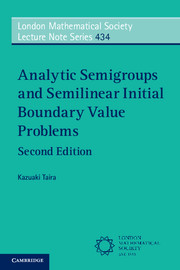Book contents
- Frontmatter
- Dedication
- Contents
- Preface to the Second Edition
- Preface to the First Edition
- 1 Introduction and Main Results
- 2 Preliminaries from Functional Analysis
- 3 Theory of Analytic Semigroups
- 4 Sobolev Imbedding Theorems
- 5 Lp Theory of Pseudo-Differential Operators
- 6 Lp Approach to Elliptic Boundary Value Problems
- 7 Proof of Theorem 1.1
- 8 Proof of Theorem 1.2
- 9 Proof of Theorems 1.3 and 1.4
- Appendix A The Laplace Transform
- Appendix B The Maximum Principle
- Appendix C Vector Bundles
- References
- Index
Preface to the Second Edition
Published online by Cambridge University Press: 05 April 2016
- Frontmatter
- Dedication
- Contents
- Preface to the Second Edition
- Preface to the First Edition
- 1 Introduction and Main Results
- 2 Preliminaries from Functional Analysis
- 3 Theory of Analytic Semigroups
- 4 Sobolev Imbedding Theorems
- 5 Lp Theory of Pseudo-Differential Operators
- 6 Lp Approach to Elliptic Boundary Value Problems
- 7 Proof of Theorem 1.1
- 8 Proof of Theorem 1.2
- 9 Proof of Theorems 1.3 and 1.4
- Appendix A The Laplace Transform
- Appendix B The Maximum Principle
- Appendix C Vector Bundles
- References
- Index
Summary
The purpose of this monograph is to provide a careful and accessible exposition of a functional analytic approach to initial boundary value problems for semilinear parabolic differential equations of second order. Unlike many other books on analytic semigroups, it focuses on the relationship between the three interrelated subjects in analysis: elliptic boundary value problems and parabolic initial boundary value problems, with emphasis on the general study of analytic semigroups. This semigroup approach can be traced back to the pioneering work of Fujita– Kato [18] on the Navier–Stokes equation in fluid mechanics.
More precisely, we study a class of degenerate elliptic boundary value problems for second-order, uniformly elliptic differential operators in the framework of Lp Sobolev spaces which includes as particular cases the Dirichlet and Robin problems. We prove that this class of boundary value problems provides an interesting example of analytic semigroups in the Lp topology. We confined ourselves to the simple but important boundary condition. This makes it possible to develop our basic machinery with a minimum of bother and the principal ideas can be presented concretely and explicitly.
This monograph will have great appeal to both advanced students and researchers as an effective introduction to the three interrelated subjects in analysis: analytic semigroups, elliptic boundary value problems and initial boundary value problems for semilinear parabolic differential equations. Moreover, this book will provide a method for the study of elliptic boundary value problems, a powerful method clearly capable of further extensive development.
The first edition of this book (1995) was based on the lecture notes given at the University of Turin and the University of Bologna in Italy (1988) under the sponsorship of the Italian “Consiglio Nazionale delle Ricerche” and at the University of the Philippines (1989) in the course of the JSPS–DOST exchange program. The first edition was found useful by a number of people from different areas in analysis.
Our approach is distinguished by the extensive use of the techniques characteristic of recent developments in the theory of partial differential equations. The main technique used is the calculus of pseudo-differential operators which may be considered as a modern theory of classical potentials.
- Type
- Chapter
- Information
- Publisher: Cambridge University PressPrint publication year: 2016



